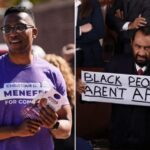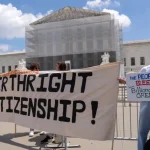
Hurricane Ian destroyed more than 5,000 homes in Southwest Florida, and damaged nearly 30,000 more in late September. Four months later, a new generation of homeless Americans are emerging in Lee County.
“People are out here on the streets. They’re just living in disparity,” said Robert McCall, an 83-year-old veteran who is currently homeless in Lee County. “They’ve taken care of themselves up to this point, but then they get the big letdown, and it’s the d— near end of their life.”
Robert McCall is homeless for the first time in his life. Hurricane Ian destroyed the veteran’s home when the Category 4 Hurricane slammed Southwest Florida with record storm surge.
“My wife is 85, I’m 83. I wasn’t going to go out and get a hotel, motel or anything until we found out where we stood with our insurance because I didn’t want to spend a lot of money and find out that they weren’t going to pay. So we slept in our car for 36 days,” McCall said.
The family is currently waiting for an insurance check before deciding their next steps. They sleep in between cars, tents, and a donated RV on Pine Island.
“Every time we’ve called the insurance company…they wouldn’t even acknowledge our claim number, who we were, or anything. They said that we would just have to wait,” McCall said. “This isn’t the country that I was raised in. The insurance companies I believe have let everybody down, because everyone’s waiting of course for money to see where they stand or to be able to use it to do something. We wouldn’t be here right now if we received it in a timely manner. They’re gonna say they’re overwhelmed and everything else but these storms and these disasters have been going on for many years, and there’s no reason why our federal government and these insurance companies couldn’t answer in a timely manner.”
Beacon of Hope, a non-profit organization in Lee County, is counting how many residents are homeless due to the Hurricane. Early estimates show hundreds of former homeowners are now living in tents or their cars, and countless more are living in moldy homes that were already condemned.
“They promised me a FEMA trailer right off the bat four months ago or so.,” said Nicole Williams, a resident on Pine Island. “They don’t have a timeline for me still nor have they responded to the continued rental assistance so I’m being forced to live in a condemned home.”
Nicole Williams moved back into her home on Pine Island, despite the home being covered in mold. Willams couch-surfed and stayed with friends for months while waiting for a FEMA trailer to come, but the trailer never arrived.
“I have broken mentally so many times you have no idea. Like I said, I have been insanely blessed or I wouldn’t still be here if not for my friends but living on your friend’s couch or in their spare laundry room. It will wear on you. Those blessings will wear on you and all you want to do is get home and have a home and have that peace and serenity and that sanctuary. That is supposed to be yours,” Williams said in an emotional interview outside her home. “I do think our federal government needs to answer for harming their people by not doing their job in a timely manner.”
In the wake of Hurricane Ian, tens of thousands of homes were damaged in Lee County. Volunteers believe the housing crisis in Southwest Florida is far from over.
“There’s so many people that need help. There are individuals that have fallen through the cracks, their basic needs are still not being met,” said Dana Dodson, the Director of CPE–Project Hope. “What we’re trying to do is bring awareness to that and have other outside agencies come in and support us, especially here on Pine Island.”
HURRICANE IAN VICTIMS RETURN TO BATTERED HOMES AS DEATH TOLL CONTINUES TO RISE
Dana Dodson is the Director and Project Manager for CPE–Project Hope. The organization is providing mental health services to those affected by Hurricane Ian as part of disaster recovery. Dodson serves some of the hardest hit areas of Hurricane Ian: Lee, Hendry, Glades, and Collier Counties. The Project Manager also personally knows how much Hurricane Ian devastated families in Southwest Florida.
“My personal experience… I did come from Pennsylvania, I came down here to do disaster relief. Like the residents here, also the volunteers that come down here do not have places to live. So I do live in my car. I spend time with friends that I’ve met here in their homes, couch-surfing, I’ve also slept in tents. I’ve basically slept wherever it was safe,” said Dodson. “There’s limited access to housing.”
Dodson believes part of the solution is outreach, making sure Lee County isn’t forgotten during the long recovery process.
“I think that what we’re actually looking for is to bring awareness to the area. I think that people don’t realize the devastation that is still here. Many people are realizing that there are still people without places to live. There are still people without the basic needs being met. There are still individuals with no electricity on the islands, and even in Fort Myers,” Dodson said.
FEMA HEAD DEFENDS LEE COUNTY, FLORIDA OFFICIALS’ HURRICANE IAN PREP: STORM WAS “VERY UNPREDICTABLE”:
The Federal Emergency Management Agency has received more than 911,000 applications in designated counties from Hurricane Ian survivors in Florida. Of those, 378,000 have received assistance through FEMA’s Individuals and Households Program. A spokesperson with FEMA told Fox News the remaining applicants may still be awaiting insurance settlements, in the process of submitting additional documentation, or they may have been referred to another organization for assistance to meet their needs such as our partners at the Small Business Administration or at the U.S. Department of Agriculture.
Four months later, FEMA is still working to move travel trailers to Southwest Florida for eligible families. To date, 226 households have been licensed to travel trailers (101), mobile homes (71) or direct lease units (54). An additional 299 travel trailer and mobile home units are being prepared for occupancy and site inspections are taking place for more units.
“Following the immediate response to Hurricane Ian, one of FEMA’s top priorities is providing temporary housing for applicants who cannot live in their homes because of damage from Hurricane Ian,” the agency said. “FEMA has awarded funds to nearly 68,000 households affected by Hurricane Ian for rental assistance or basic repairs of their storm-damaged home. To date more than 4,500 households have participated in temporary hotel stays paid for by FEMA, while FEMA’s Direct Lease program has secured 333 units. FEMA is in the process of identifying applicants based on location from their damaged dwelling and household composition for potential units within a reasonable commuting distance.”
Scroll down to leave a comment:








